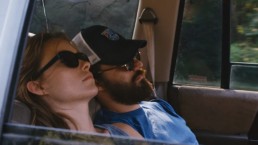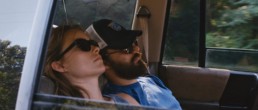‘Drinking Buddies’: Love Told Through the Lens of Disenchantment
Here, if you're not one of these four "types" of people, you're probably going to ask yourself: Why Is This Important?
As adult relationships go, they can be pretty childish. Childish in the sense that adults are just that: grown-up children. Still wide-eyed and without answers, hopelessly trying to join culturally warped fantasies of love with real life, grown up-y problems, the result is often an unglamorous reality that deconstructs and dismantles every typical trope that exist in the genre of the romantic comedy. At least that is what is happening here, in mumblecore alum Joe Swanberg’s latest, Drinking Buddies.
For framing purposes, the mumble-core scene is distinguished and loosely attributed to films that operate as an extension of “indie” filmmaking, going steps further (or steps shorter) in cinematic storytelling to capture a sense of “real life,” at least how that “real life” pertains to 21st century thirty-something caucasian Americans. Which is what this movie is all about. Kate (Olivia Wilde), a “one of the guys” craft beer worker, and Luke (Jake Johnson), are the kind of co-workers and friends with the sort of pal-around chemistry that reads as the most naturally compatible romantic pairing. Their playfulness is all very “charged,” in that “we could jump each others’ bones right here and now if we just acknowledged the sexual tension” kind of way. Perhaps they feel so free to act this way due because they are both in relationships; her with nice guy Chris (Ron Livingston), and he with the more timid yet Jill (Anna Kendrick). What leads to the foursome going away to weekend at a cabin brings the possible realizations of each finding the other’s partner more desirable. This, while beer is so passively poured and gulped that it acts as the cultural cigarette break.
The best way to describe this movie is an adult’s rom-com. Where the set-up of star-crossed lovers crossed up in each others’ better half would act as any perfect setup for easily slicked Studio comedy-fare, this story is told through the lens of disenchantment, harsh and ugly truths of the real world that the characters have to acknowledge and put up with. Although “harsh and ugly” might be words too bold to use, which in this case, refers to the collectively attractive tribe’s dealing with the “un-perfect-ness” of their situations. As in life, things are barely dealt with, and true emotions are scarcely expressed, and that slice of life is exactly with Swanberg and Co. offer here. One man and his cup of tea will appreciate the authentic capturing of this possibly very-real time in a possibly very relatable person’s life. Another man’s cup might overfloweth with indulgence and vapidness. Both arguments are perfectly acceptable to make, as they each act as a truth that compliment and necessitate the other, like two sides to the same beer-soaked coaster.
“Olivia had great ideas about Kate, and brought a lot of her own life to it, Jake Johnson and Anna Kendrick shared their own relationship experiences with me so that we could blend them with mine to make Luke and Jill as relatable as possible.” -Joe Swanberg
The one thing that the movie definitely has, and what it solidly works off of, is its freedom. Working from only a general outline, the actors and director improvised the entire script. This creates an interesting effect, for many reasons. First, in a cinematic sense, we get to see these actors as the most real-life types of people that could be captured on screen in a fictional story. Following that, this allows us to see “Olivia Wilde” as “herself,” mainly, and everyone else as “themselves” as they act (and react) and make decisions from their most basic of instincts. In fact, Swanberg even notes of his actors’ involvement and contributions to their characters: “Olivia had great ideas about Kate, and brought a lot of her own life to it, Jake Johnson and Anna Kendrick shared their own relationship experiences with me so that we could blend them with mine to make Luke and Jill as relatable as possible.” What results is seeing Wilde, Johnson, Livingston, and Kendrick, as the most likable, non-offensive people to exist in cinematic history. They’re all so normal that it’s not normal. The fact that Kate and Luke are so comfortable with their unacknowledged affections towards each other only heightens the level of non-committed cultural attitude they have towards anything they find “serious” in life, as flirting with another person’s partner would prove. These adults are so cool with everything that Kate finds no qualms with skinny-dipping in front of Luke, while Luke finds no problem wearing that yearningly existent beard. Though I’d be remissed to not express how much I liked and enjoyed each actor’s onscreen selves, so much so that the film feels very much on this side of a winning outing.
Secondly, since the actors don’t (really) know what’s going to happen in the moment of the scene, we are can only observe the scene as they observe and find (read: create) the scene in real time. For viewing purposes, this denies all audience participation, really, or at least denies us from having the type of experience where we feel connected to a film by relating to a more universally speaking message. Here, if you’re not one of these four “types” of people, you’re probably going to ask yourself: Why Is This Important? That answer: this movie, and style of movie-making, speaks more to a type of human than to the human “condition.”
But maybe that’s what it’s all about. Maybe there is no objective “serious-ness” in adult life. That our romantic partners are nothing more than a continuously revolving door of companions to make easy conversation with. Nothing more than Drinking Buddies. As an “adult-movie,” it’s high-mindedness doesn’t really invite the viewer “in.” It can be said, then, that this movie acts with how it is; like grown-up kids at a bar with only four seats, as if to say, “You Can’t Sit With Us.”
Note: I found the movie’s soundtrack to be quite enjoyable, and after the movie’s climactic offering set to “It Soon Will Be Fire” by Richard Young, I felt compelled to find the music online. Follow the jump to hear all the songs (more than a few from Grammy Award winning artist Bon Iver’s recording label ‘Jagjaguwar’) from one assembled Spotify playlist: http://playlists.net/drinking-buddies-soundtrack
Ryan Rojas
Ryan is the editorial manager of Cinemacy, which he co-runs with his older sister, Morgan. Ryan is a member of the Hollywood Critics Association. Ryan's favorite films include 2001: A Space Odyssey, The Social Network, and The Master.


